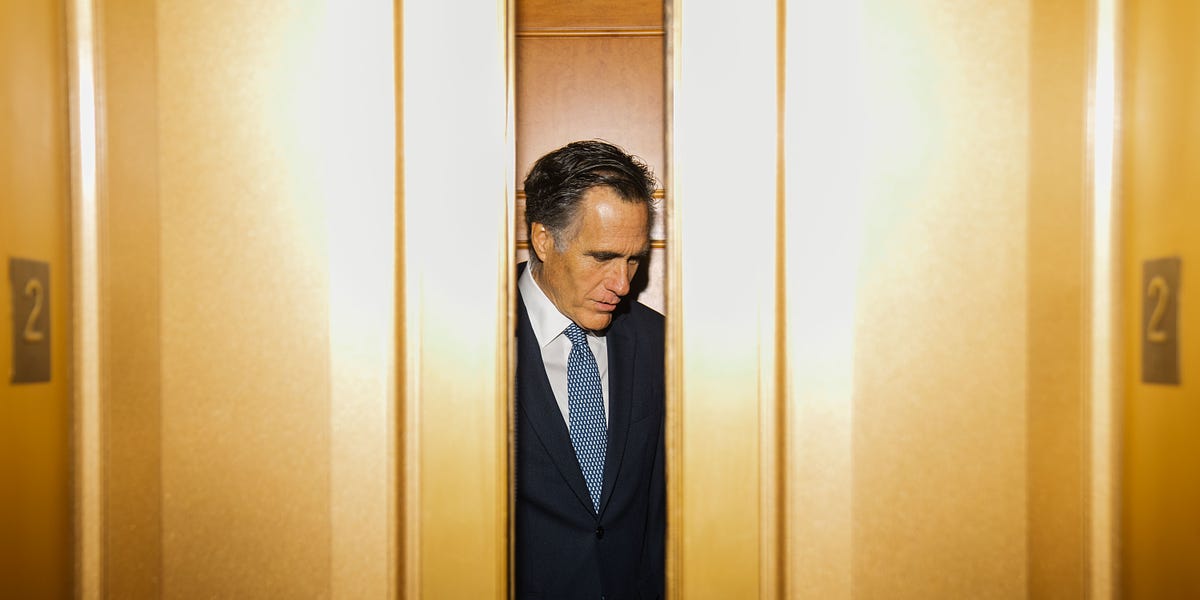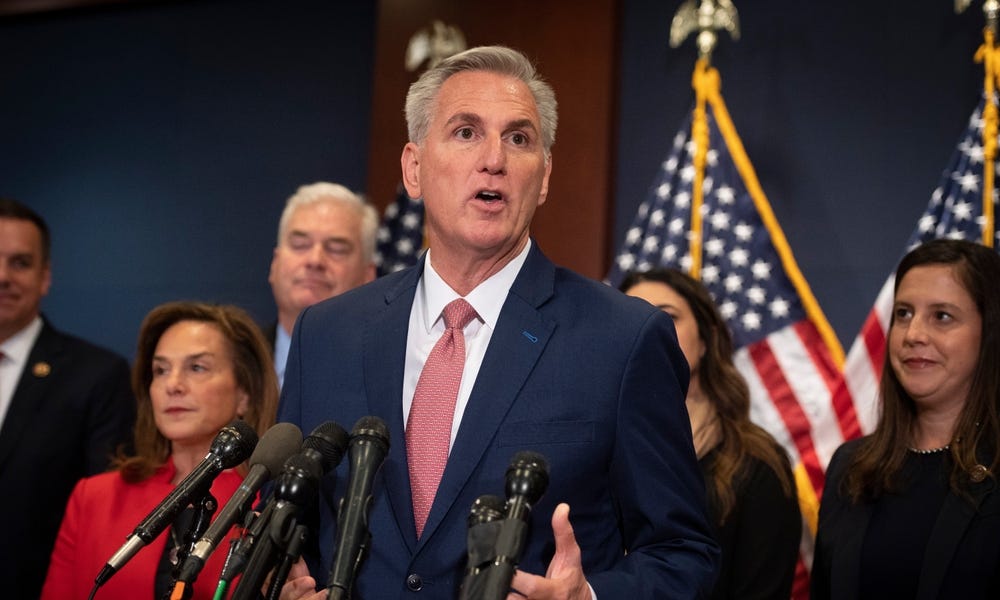Sixties Fan
Diamond Member
- Mar 6, 2017
- 58,436
- 11,066
- 2,140
- Thread starter
- #1,461
Follow along with the video below to see how to install our site as a web app on your home screen.
Note: This feature may not be available in some browsers.
The move is a familiar one — a prominent Republican gathering the courage to arrest his party’s drift toward Trumpism and then, when the next election comes around, heading for the exits.
But rarely has such an exit been so consequential for that segment of the party. And rarely has it come with the degree of resignation Romney expressed. Unlike other Trump critics who have opted to retire, Romney appeared to have had more than a fighting chance, had he opted to run again. Utah is an unusual state, deeply conservative but also with a large vein of Trump skepticism coursing through that conservatism. And Romney’s personal brand there — dating to his stewardship of the 2002 Salt Lake City Olympics — clearly gave him latitude that other Republicans have not enjoyed. [...]
In an interview with longtime Washington Post politics correspondent Dan Balz, Romney played down the idea that he would get involved in supporting a 2024 candidate who is running against Trump. The reason: It would be counterproductive.
Kennedy finally returned to coach single game last Friday—staying at a friend’s house, since he no longer had a residence in Washington—and then quit.When a court ordered the school district to rehire him, the Seattle Times’ Danny Westneat reported, they initially did not get a response. While Bremerton students were preparing for a new season of football, Kennedy was meeting with former Vice President Mike Pence. On the night before their first game of the season, he was awarded an engraved rifle at an American Legion convention. Meetings with former President Donald Trump, and later, Florida Gov. Ron DeSantis, crowded his calendar. (Kennedy dined with DeSantis but remains loyal to Trump.)
In other words, this was anything but brief, quiet, or personal. It was a performance carried out while he was on duty working for a public school system, and while students remained under his authority. Of course a court that was willing to pretend his praying was brief, quiet, and personal was also willing to believe that Kennedy actually wanted his job back rather than raking in money on the right-wing speaking circuit and schmoozing with politicians.While Kennedy’s letter asserted that his prayers “occurr[ed] ‘on his own time,’ after his duties as a District employee had ceased,” the District pointed out that Kennedy “remain[ed] on duty” when his prayers occurred “immediately following completion of the football game, when students are still on the football field, in uniform, under the stadium lights, with the audience still in attendance, and while Mr. Kennedy is still in his District-issued and District-logoed attire.”
The District further noted that “[d]uring the time following completion of the game, until players are released to their parents or otherwise allowed to leave the event, Mr. Kennedy, like all coaches, is clearly on duty and paid to continue supervision of students.”

As I noted back in 2019, not only is this passage not especially controversial—it was almost a boilerplate restatement of what conservatives have claimed to believe for decades.To a great degree, a presidency shapes the public character of the nation. A president should unite us and inspire us to follow “our better angels.” A president should demonstrate the essential qualities of honesty and integrity, and elevate the national discourse with comity and mutual respect. As a nation, we have been blessed with presidents who have called on the greatness of the American spirit. With the nation so divided, resentful and angry, presidential leadership in qualities of character is indispensable.
Romney is still wrestling with the question.As the boos intensified, Romney asked the crowd:
That question seems to hang in the air. How is the GOP not thoroughly humiliated by what it is becoming?“Aren’t you embarrassed?”

Mitch McConnell once said to Romney:“He has none of the qualities you would want in the president, and all of the qualities you wouldn’t.“ But that senator wouldn’t say it publicly.
**“You’re lucky. You can say the things that we all think. You’re in a position to say things about him that we all agree with but can’t say.”
**“There are deranged people among us,” he told me. And in Utah, “people carry guns.”
“It only takes one really disturbed person.”
He let the words hang in the air for a moment, declining to answer the question his confession begged: How long can a democracy last when its elected leaders live in fear of physical violence from their constituents?
**Romney sends his text: “In case you have not heard this, I just got a call from Angus King, who said that he had spoken with a senior official at the Pentagon who reports that they are seeing very disturbing social media traffic regarding the protests planned on the 6th. There are calls to burn down your home, Mitch; to smuggle guns into DC, and to storm the Capitol. I hope that sufficient security plans are in place, but I am concerned that the instigator—the President—is the one who commands the reinforcements the DC and Capitol police might require.”
McConnell never responds.
**He thought about the text message he’d sent to McConnell a few days earlier explicitly warning of this scenario. How were they not ready for this? It was, in some ways, a perfect metaphor for his party’s timorous, shortsighted approach to the Trump era. As a boy, he’d read Idylls of the King with his mother; now he could understand the famous quote from Tennyson’s Guinevere as she witnesses the consequences of corruption in Arthur’s court: “This madness has come on us for our sins.”
**Shortly after moving into his Senate office, Romney had hung a large rectangular map on the wall. First printed in 1931 by Rand McNally, the “histomap” attempted to chart the rise and fall of the world’s most powerful civilizations through 4,000 years of human history. When Romney first acquired the map, he saw it as a curiosity. After January 6, he became obsessed with it. He showed the map to visitors, brought it up in conversations and speeches. More than once, he found himself staring at it alone in his office at night. The Egyptian empire had reigned for some 900 years before it was overtaken by the Assyrians. Then the Persians, the Romans, the Mongolians, the Turks—each civilization had its turn, and eventually collapsed in on itself. Maybe the falls were inevitable. But what struck Romney most about the map was how thoroughly it was dominated by tyrants of some kind—pharaohs, emperors, kaisers, kings. “A man gets some people around him and begins to oppress and dominate others,” he said the first time he showed me the map. “It’s a testosterone-related phenomenon, perhaps. I don’t know. But in the history of the world, that’s what happens.” America’s experiment in self-rule “is fighting against human nature.”
“This is a very fragile thing,” he told me. “Authoritarianism is like a gargoyle lurking over the cathedral, ready to pounce.”
Romney had been less judgmental of Ryan’s acquiescence to Trump than he’d been of most other Republicans’. He believed Ryan was a sincere guy who’d simply misjudged Trump.
**And yet, here was Ryan on the phone, making the same arguments Romney had heard from some of his more calculating colleagues. Ryan told him that voting to convict Trump would make Romney an outcast in the party, that many of the people who’d tried to get him elected president would never speak to him again, and that he’d struggle to pass any meaningful legislation. Ryan said that he respected Romney, and wanted to make absolutely sure he’d thought through the repercussions of his vote. Romney assured him that he had, and said goodbye.
**What bothered Romney most about Hawley and his cohort was the oily disingenuousness. “They know better!” he told me. “Josh Hawley is one of the smartest people in the Senate, if not the smartest, and Ted Cruz could give him a run for his money.” They were too smart, Romney believed, to actually think that Trump had won the 2020 election. Hawley and Cruz “were making a calculation,” Romney told me, “that put politics above the interests of liberal democracy and the Constitution.”
**“I don’t know that I can disrespect someone more than J. D. Vance,” Romney told me.
They’d first met years earlier, after he read Vance’s best-selling memoir, Hillbilly Elegy. Romney was so impressed with the book that he hosted the author at his annual Park City summit in 2018. Vance, who grew up in a poor, dysfunctional family in Appalachia and went on to graduate from Yale Law School, had seemed bright and thoughtful, with interesting ideas about how Republicans could court the white working class without indulging in toxic Trumpism. Then, in 2021, Vance decided he wanted to run for Senate, and reinvented his entire persona overnight. Suddenly, he was railing against the “childless left” and denouncing Indigenous Peoples’ Day as a “fake holiday” and accusing Joe Biden of manufacturing the opioid crisis “to punish people who didn’t vote for him.” The speed of the MAGA makeover was jarring.
[It] was hard to dispute that the battle for the GOP’s soul had been lost. And Romney had his own soul to think about. He was all too familiar with the incentive structure in which the party’s leaders were operating. He knew what it would take to keep winning, the things he would have to rationalize.
“You say, ‘Okay, I better get closer to this line, or maybe step a little bit over it. If I don’t, it’s going to be much worse,’ ” he told me. You can always convince yourself that the other party, or the other candidate, is bad enough to justify your own decision to cross that line. “And the problem is that line just keeps on getting moved, and moved, and moved.”


But something else also happened. In his majority opinion in Dobbs v. Jackson Women’s Health Organization, Justice Samuel Alito invited Americans to decide directly how much abortion access to allow. “In some states, voters may believe that the abortion right should be even more extensive,” Alito wrote. “Voters in other states may wish to impose tight restrictions.” Unexpectedly, in red and purple states that have put the question directly to the public — asking people to reject or support abortion rights in a ballot measure — they have voted against new restrictions or in favor of more access every time.
